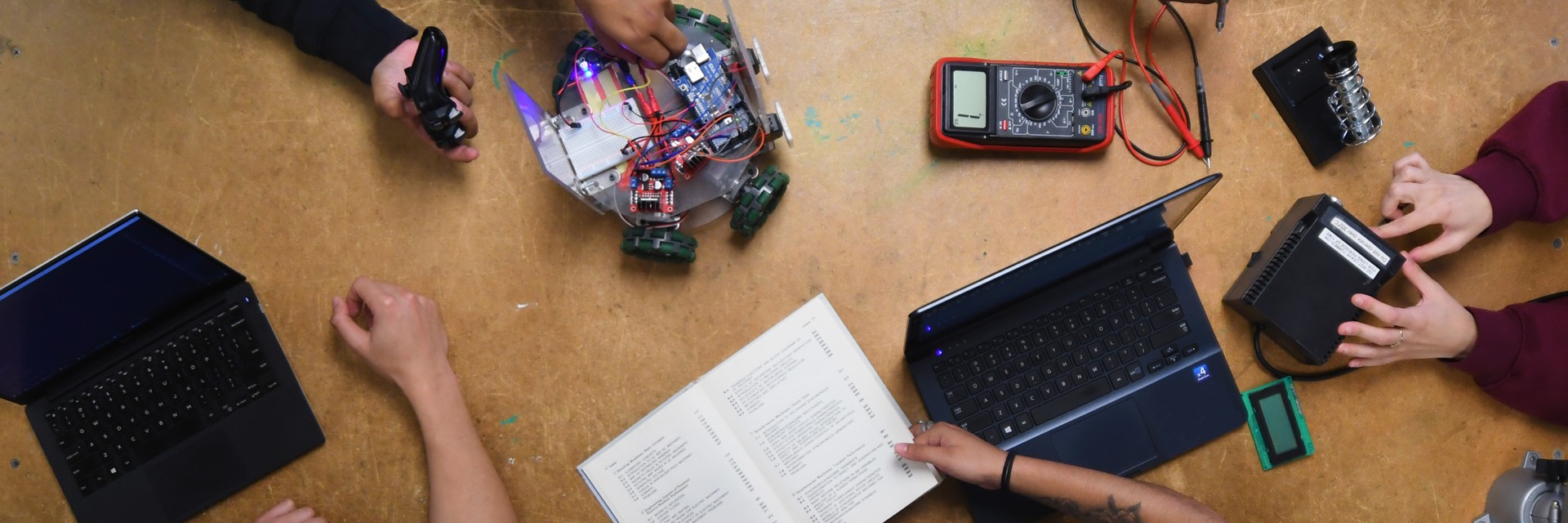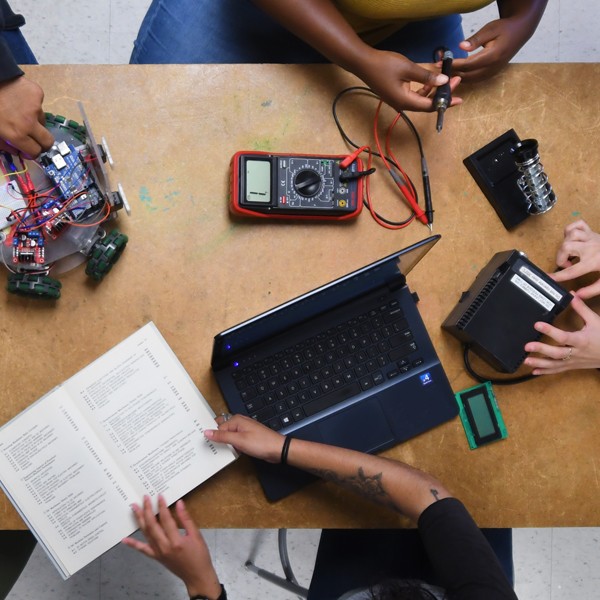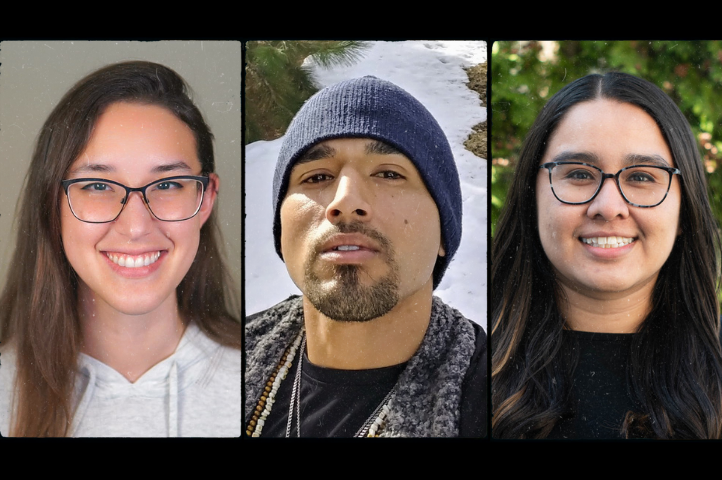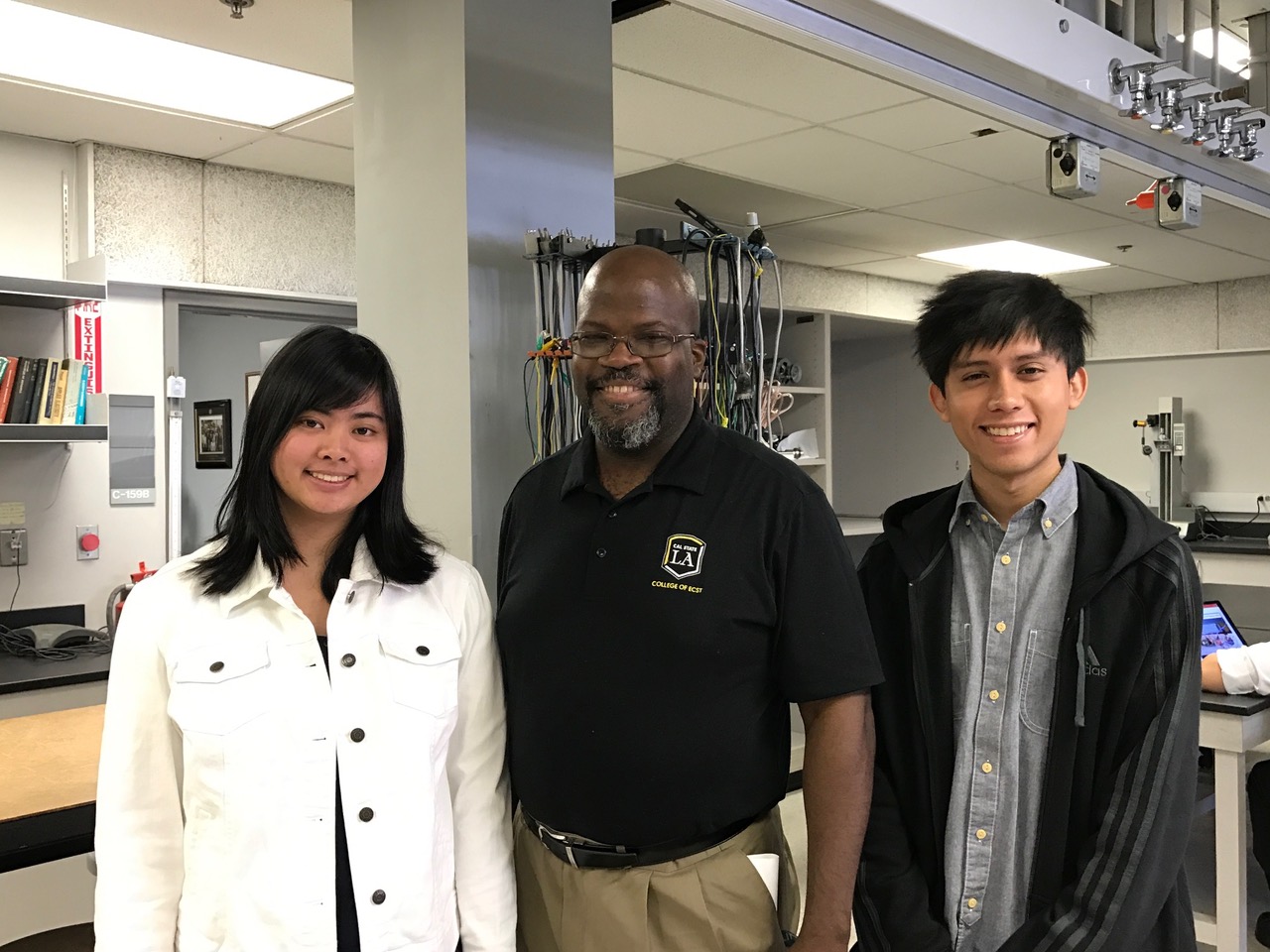Photo: Amy Guttman, Emmanuel Limaco, Ruby Mora
STEM Advantage was founded when a woman who majored in Mathematics and Computer Science as an undergraduate and, in the middle of a successful career as a technology consultant, reached a point when she could no longer ignore the lack of diversity in technical positions in her client companies. Says Lee Ann Kline, Founder, and President of STEM Advantage, “I was working with IT departments in some of the nation’s largest financial institutions on the East coast. There were few women and literally, I could count on one hand the number of blacks and Latinx professionals in technical jobs. There was so little diversity, and the numbers were going in the wrong direction.”
So, when Kline relocated to Southern California from the East coast in 2011, she began to engage Chief Information Officers in major companies in conversations about the lack of women and minorities in STEM and what could be done about it. Soon, the problem—and a solution—became clear to Kline.
“Talent is equally distributed, but opportunity is not,” Kline says. “Students who go to elite private colleges and universities like USC or public institutions like UCLA get all the help they need. But many underserved students in Southern California attend universities in the California State University system. The CSU system is the largest and most ethnically diverse, four-year, public higher education system in the nation with a student body of more than 50% people of color. These young people are often first-generation college students in lower income families. They work 20-40 hours a week putting themselves through school. They’re smart, hardworking, and have strong ties to their families and the communities in which they live. We asked ourselves, ‘Who is helping them?’”
Talent is equally distributed, but opportunity is not.
In 2012, Kline formed STEM Advantage. A 501(c)(3) nonprofit, the organization mentors, prepares, and inspires women and men in underserved communities to pursue STEM majors and careers through scholarships, paid internships, one-to-one mentors, professional development, and community. The vision is to provide economic and social mobility to marginalized young people while providing a vetted pipeline of diverse STEM talent to businesses to fill their workforce needs.
Today, STEM Advantage has relationships with eight CSU campuses, including five in the greater Los Angeles area, one of which is Cal State LA. Of the 175 STEM Advantage Scholars named in the fall of 2021, 45 study at Cal State LA—more than at any other CSU.
Photo: T. Fox with two ECST students
“Cal State LA is ranked #1 in the country for the upward mobility of its students,” says Kline. “One of our Board members, T. Fox, was the Professional Placement Coordinator for the College of Engineering, Computer Science, and Technology (ECST) at Cal State LA and is still at Cal State LA in a different capacity. Emily Allen, Dean of ECST, is a member of our Advisory Board.”
Says Dean Allen, “STEM Advantage is a great organization with programs that complement the ones we offer our students. Our missions are very aligned. We’re honored to collaborate with Lee Ann and her staff on student success.”
To say that STEM Advantage is fulfilling its mission is an understatement. Since its founding 10 years ago, 600 students at CSUs have received more than $1.5 million in scholarships as well as help finding paid internships while in school and full-time jobs after graduation. Along the way, they are mentored by professionals in their chosen fields, including recent graduates, and invited to attend career panels and workshops on a range of topics such as creating an elevator pitch and professional networking.
These programs are paying off for STEM Advantage Scholars. Pre-pandemic, all Scholars graduated with STEM majors and secured entry-level jobs in their majors with a $75,000 average starting salary or entry into graduate school. Demographically, 52% of STEM Advantage Scholars are women, 87% are people of color, and 72% are first-generation college students from lower income families. Before college, 87% earned under $20,000 annually. As for paying it forward, graduating STEM Advantage Scholars form a very strong alumni network, with many of them serving as mentors for the next generation of Scholars, referring Scholars into their companies, and participating in career panels and workshops. In 2021, the Los Angeles Business Journal honored STEM Advantage as Diversity, Inclusion & Equity Nonprofit of the Year.
With growing recognition and support, it’s no surprise that the number of STEM Advantage Scholars increases each year. Twelve students were in the organization’s first cohort; 200 students are expected in the fall of 2022. Behind the numbers are the individual STEM Advantage Scholars and their stories.
Rubi Mora emigrated to the U.S. when she was 17 years old and in high school, with the goal of going to college. First, she would have to finish high school and then, learn English. With these accomplishments behind her, Mora was able to focus on her original goal. “I had no idea which college I wanted to go to,” says Mora. “My cousin was studying Mechanical Engineering at Cal State LA and told me about the engineering programs. I didn’t even know what engineering was, but it sounded fun and exciting. I decided to go to Cal State LA.”
That was in 2015. In March 2018, Mora graduated from ECST with a degree in Mechanical Engineering and headed off to Detroit to work for GM as a system design engineer on an autonomous vehicle team. “GM has an autonomous driving vision: zero crashes, zero congestion, and zero pollution,” says Mora. “I’m working on zero crashes with better sensing systems.”
At the end of her sophomore year at Cal State LA, Mora was introduced to Lee Ann Kline by T. Fox, then an academic counselor at ECST who now serves on the STEM Advantage Board. “As a first-generation college student without a network, I did everything I possibly could to get into STEM Advantage,” says Mora. “Yes, it was about the scholarship. But my dream was to get an internship in a space company. To my surprise, the first internship opportunity I got was with SpaceX. I was super excited, but also very nervous.”
Becoming a STEM Advantage Scholar resulted in another big change in Mora’s life. When she started at Cal State LA, she was living in Whittier and faced a two-to four-hour commute by bus every day. “I had to get up early to get to school and I had to leave campus every day in time to catch a 7:00 p.m. bus home,” says Mora. “STEM Advantage supported me financially so I could move closer to Cal State LA, which allowed me to focus on school and extracurricular activities that helped me get my first job. I was able to join study groups and spend more time with my peers. Just being on campus and having people notice you is huge. More studying meant better grades. I also got more sleep! The scholarship got rid of so many barriers.”
STEM Advantage supported me financially so I could live closer to Cal State LA, which allowed me to focus on school and extracurricular activities that helped me get my first job.
Having more time also meant that Mora could participate on Cal State LA’s EcoCAR Mobility Challenge team, which piqued her interest in cars and ultimately led to her current position at GM. She is also working toward a master’s degree in robotics at the University of Michigan.
Says Mora, “Cal State LA was the perfect place for me. As a first-generation college student, I didn’t have to explain my experiences to anyone. STEM Advantage gave me the support I needed to get my degree. Now, I’m paying it forward by mentoring students and passing along information about job opportunities at GM.”
As a first-generation college student, I didn’t have to explain my experiences to anyone. STEM Advantage gave me the support I needed to get my degree.
Added Mora, “STEM Advantage literally changes people’s lives. Now we’re changing people’s lives, so the impact is magnified.”
Manny Limaco was born shortly after his mother emigrated to the U.S. She went to college and got a master’s degree here, and is now a social worker. Limaco credits her with inspiring him to go to college. His path was not a straight line.
Says Limaco, “Unfortunately, I grew up with a lot of gang influence and joined a gang when I was a teenager. I graduated from high school and did a couple of years of college, but I wasn’t really engaged. I didn’t know where I was going, I was doing a lot of drugs at the time, and I ended up in prison. There, I decided I needed to do something different with my life. So, I went back to college in prison and earned the first 4.0 GPA in my life.”
When Limaco had served his sentence and left prison, the program he was released into did not allow him to go to school. Instead, he was required to stay in the program for a year and then go to work.
“I worked lots of temp jobs, but I could never get a permanent job because of my criminal history,” says Limaco. “I was turned down for seven jobs not because I couldn’t do the work, but because I didn’t pass the background checks. At some point, I decided to go to school to complete a degree, to show employers I was serious about getting a job.”
Limaco started his studies at Bakersfield College with the idea that he’d get a certificate in construction. However, a counselor at the college looked at his high school transcript and saw that he had gotten good grades in math. She suggested Limaco set his sights on becoming an engineer.
Fired up by that suggestion, in the three years he attended Bakersfield College, Limaco earned four associate degrees, in math, physics, communications, and liberal arts. They paved the way for his transfer to Cal State LA, which he did in the fall of 2019. A few months later, Limaco was named a STEM Advantage Scholar. He also got a job working part-time on campus for Project Rebound, a program for formerly incarcerated students. In May 2022, he will graduate with a degree in Civil Engineering.
There were additional heartaches and challenges along the way. Limaco was homeless when he started at Bakersfield College. His partner passed away the day he graduated. During the years he was at Cal State LA, his uncle, his father, and his grandmother all passed away, the latter two from COVID. When his father died, Limaco became the sole caregiver for his younger brother, who is wheelchair-bound with cerebral palsy.
Says Limaco, “STEM Advantage has just been there for me, especially Lee Ann, and more than just academically. The scholarship was so important and when it was time for me to take the structural engineering exam that is required to get a license, they gave me a stipend. Without financial support, from STEM Advantage, I would not have been able stay in school and pay rent on the house where we live, which is set up for my brother.”
Without financial support from STEM Advantage, I would not have been able stay in school.
Now, just about to graduate, Limaco is facing new hurdles as he submits applications for full-time, permanent jobs working in civil engineering. Having just received his Certificate of Rehabilitation from the State of California, which is a strong endorsement from the court that a person’s criminal history is behind them, he’s hoping for better outcomes in the job market this time around.
“My goal is to get a job in civil engineering,” says Limaco. “But eventually, I want to build the world’s largest homeless shelter and get as many people off the street as possible.”
Amy Guttman will graduate from ECST with a degree in Computer Science in May 2022. Guttman was a transfer student from El Camino College where she earned a Certificate of Achievement with High Honors in Computer Science. While a STEM Advantage Scholar at Cal State LA, she had internships at both the Naval Sea Systems Command and Accenture. In the fall of 2022, Amy will join Accenture full time as a Technology Development Program Analyst, where she will work on a team that delivers platform and custom-designed solutions for major organizations.
This happy outcome for Guttman belies the challenges she faced in college, starting at UC Davis where she studied biological systems engineering. As a woman and a person of color, she felt lost as she struggled to gain a foothold and find her community. When family responsibilities drew her back to Southern California, she restarted her studies at El Camino College in 2016 and in the fall of 2019 entered Cal State LA. Within two months, she was recommended to STEM Advantage and got a phone call from Lee Ann Kline.
“When Lee Ann called me, she just said, ‘How can we support you?’” says Guttman. “Right away, I was paired with a career mentor in my field, someone who had recently graduated and was also a woman and a person of color. She understood the troubles I was having and helped me realize I wasn’t unique, that other people had struggles, too. This made me feel much less alone, which really helped when everything shut down during the pandemic and we had to be in isolation.”
Says Guttman, “STEM Advantage is so much more than a scholarship. It’s like triage where they figure out what each student needs and provides it. Everyone is there to help students succeed. But you also find community with fellow Scholars. I have never felt more at home than I have with my STEM Advantage cohort. STEM Advantage made me realize that no one is truly self-made. We’re made by our communities.”
I have never felt more at home than I have with my STEM Advantage cohort. STEM Advantage made me realize that no one is truly self-made. We’re made by our communities.



